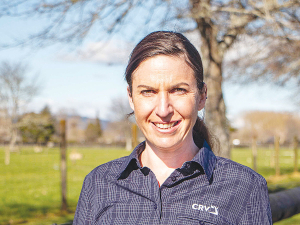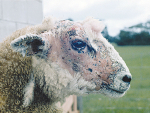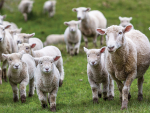As New Zealand swelters in record hot and humid conditions, dairy farmers need to be more vigilant than usual against facial eczema (FE) as spore counts start to climb.
According to reports from Gribbles Veterinary, national spore counts that cause the devastating disease almost doubled in the five days between 29 January to 2 February 2024.
While they have trended downwards over the last week, CRV national sales and marketing manager and vet, Julia Baynes, says the record high temperatures and humidity of this season is creating a perfect breeding ground for the fungus responsible for FE.
“A hot and humid season like this year can lead to spore numbers increasing to toxic levels very quickly,” says Baynes. “A small amount of rain or dew and just two nights of grass temperatures of 12-13°C can cause spore counts to spike.
“I’m not surprised to see the numbers starting to climb sharply.”
Baynes is encouraging farmers to be proactive about preventing and managing FE by having a prevention plan in place, including zinc supplementation and testing.
“The critical question is always when to start zinc treatment,” says Baynes. “The answer varies from farm to farm, so farmers should be doing their own regular spore counting by getting grass samples tested weekly to gauge when counts are on the rise.”
Farmers can also spray fungicide on pasture to reduce the spore load or feed alternative crops.
“This all needs careful planning to ensure the best protection,” says Baynes.
“Spore counts can vary from farm to farm and even paddock to paddock. It’s also important farmers monitor the effectiveness of their zinc supplementation.”
As well as Gribbles Veterinary running the national facial eczema spore monitoring programme, a number of other veterinary clinics also provide this information. Baynes says herd testing can also help identify anomalies in milk production.
Facial eczema is more than just a skin disease in livestock; it causes liver damage in both symptomatic and seemingly healthy animals and can decimate production.
“FE can be a silent destroyer. For every one animal showing clinical signs of FE, nine others are suffering from liver damage,” says Baynes. “It cannot be cured. Farmers can only manage the symptoms and the liver damage can be irreversible.”
The impact of FE on a herd and its implications for animal health, welfare, and farmers’ bottom lines are significant. A 2019 study run by VetEnt showed FE can cost farmers 0.14-0.35kg milk solids per cow per day, with one farmer in the study losing $125,000 in milk production.
To help farmers tackle the challenges of FE, CRV offers support in the form of herd testing and its FE tolerant sires, which add genetics to farmers’ toolboxes in the fight against the disease.
To help farmers tackle the challenges of FE, CRV offers support in the form of herd testing and its FE tolerant sires, which add genetics to farmers’ toolboxes in the fight against the disease.
CRV’s FE-tolerant sires are the result of a decade-long programme that involved challenging bulls with the FE toxin to identify those most resistant to the disease. Farmers are urged to consider using these sires as part of their mating programme this coming season to start building their herds’ resilience to FE.
Julia says concerns have been growing internationally about how sustainable it is for farmers to continue to rely predominantly on zinc.
“It’s imperative farmers proactively look for alternatives now. One effective way to do that is through breeding animals resistant to the disease,” says Julia.
“Adopting FE-tolerant sires is another way farmers can fortify their herds against this disease, reducing the impact on their bottom lines and ensuring the well-being and longevity of their animals.”











